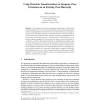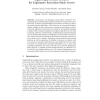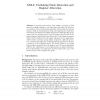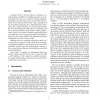1448 search results - page 13 / 290 » Restricted Stack Implementations |
106
click to vote
APLAS
2006
ACM
15 years 8 months ago
2006
ACM
Abstract. Class extensions provide a fine-grained mechanism to define incremental modifications to class-based systems when standard subclassing mechanisms are inappropriate. To...
147
click to vote
CC
2006
Springer
15 years 5 months ago
2006
Springer
We propose a new language concept called "L-closures" for a running program to legitimately inspect/modify the contents of its execution stack. L-closures are lightweight...
130
click to vote
VEE
2005
ACM
15 years 7 months ago
2005
ACM
Virtual machines (VMs) are commonly used to distribute programs in an architecture-neutral format, which can easily be interpreted or compiled. A long-running question in the desi...
107
click to vote
CC
2006
Springer
15 years 5 months ago
2006
Springer
Commonly-used memory units enable a processor to load and store multiple registers in one instruction. We showed in 2003 how to extend gcc with a stack-location-allocation (SLA) ph...
115
click to vote
APCSAC
2001
IEEE
15 years 5 months ago
2001
IEEE
A popular trend in current software technology is to gain program portability by compiling programs to an inte form based on an abstract machine definition. Such approaches date b...




